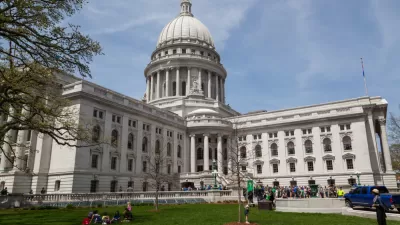A new Reason Study advocates for the "third" revenue option (with gas tax and VMT fee being the first two) for fixing the soon-to-be insolvent Highway Trust Fund - interstate highway tolling, and allowing the states to pursue that option.
Governing transportation writer Ryan Holeywell writes a sequel to his June piece on interstate tolling (posted here) where he described the advocacy efforts of Patrick Jones of the the International Bridge, Tunnel and Turnpike Association (IBTTA). Jones made a convincing argument for "Congress to simply lift the ban on interstate tolling, allowing states and cities to generate their own revenue", Holeywell wrote.
In his new piece, Holeywell turns his attention to an "ambitious" study by the Reason Foundation published this month "to explain how, exactly, tolling the interstate might work." Robert W. Poole, Jr., the study's author, writes in the executive summary of "Interstate 2.0: Modernizing the Interstate Highway System via Toll Finance (PDF)":
This study seeks to address [two] problems: replacing the aging Interstate system with a 21st-century Interstate 2.0 and taking the first major step toward implementing mileage-based user fees [MBUF]. It proposes that the United States finance the Interstate 2.0 project based on per-mile tolls collected using all-electronic tolling (AET). Over several decades, the transformation of the Interstate system, state by state, would convert at least one-fourth of all travel from per-gallon fuel taxes to per-mile charging.
MBUF, while similar to a vehicle-miles-traveled (VMT) fee, differs in this application in that only a transponder is required.
Holeywell writes that "the Reason Foundation -- along with several other stakeholders -- is asking Congress to make a major departure [from prohibition of tolls on the federal gas tax-funded interstates] and instead let states toll all the interstates, so long as they use the money to rebuild or expand the roads."
One can't help but wonder of the political pragmatism of that request. Of the three states that were granted exemptions from the tolling prohibition in a 1998 pilot program, none have yet to implement them. Furthermore, as we noted here on Sept. 10, a W.Va. blue ribbon commission is proposing to raise interstate tolls to use for roads state-wide, following in the path of Ohio.
There are no easy solutions to making the Highway Trust Fund sustainable when lawmakers refuse to increase the federal gas tax. However, the more alternatives that are proposed, and with more credible studies that support them, as this Reason Foundation study does for applying a mileage-based user fee to the interstates, legislators will have a more enlightened debate on how to fix the problem. Hopefully!
FULL STORY: How to Toll Every Interstate Highway in America

Alabama: Trump Terminates Settlements for Black Communities Harmed By Raw Sewage
Trump deemed the landmark civil rights agreement “illegal DEI and environmental justice policy.”

Study: Maui’s Plan to Convert Vacation Rentals to Long-Term Housing Could Cause Nearly $1 Billion Economic Loss
The plan would reduce visitor accommodation by 25% resulting in 1,900 jobs lost.

Planetizen Federal Action Tracker
A weekly monitor of how Trump’s orders and actions are impacting planners and planning in America.

Wind Energy on the Rise Despite Federal Policy Reversal
The Trump administration is revoking federal support for renewable energy, but demand for new projects continues unabated.

Passengers Flock to Caltrain After Electrification
The new electric trains are running faster and more reliably, leading to strong ridership growth on the Bay Area rail system.

Texas Churches Rally Behind ‘Yes in God’s Back Yard’ Legislation
Religious leaders want the state to reduce zoning regulations to streamline leasing church-owned land to housing developers.
Urban Design for Planners 1: Software Tools
This six-course series explores essential urban design concepts using open source software and equips planners with the tools they need to participate fully in the urban design process.
Planning for Universal Design
Learn the tools for implementing Universal Design in planning regulations.
Caltrans
Smith Gee Studio
Institute for Housing and Urban Development Studies (IHS)
City of Grandview
Harvard GSD Executive Education
Toledo-Lucas County Plan Commissions
Salt Lake City
NYU Wagner Graduate School of Public Service



























